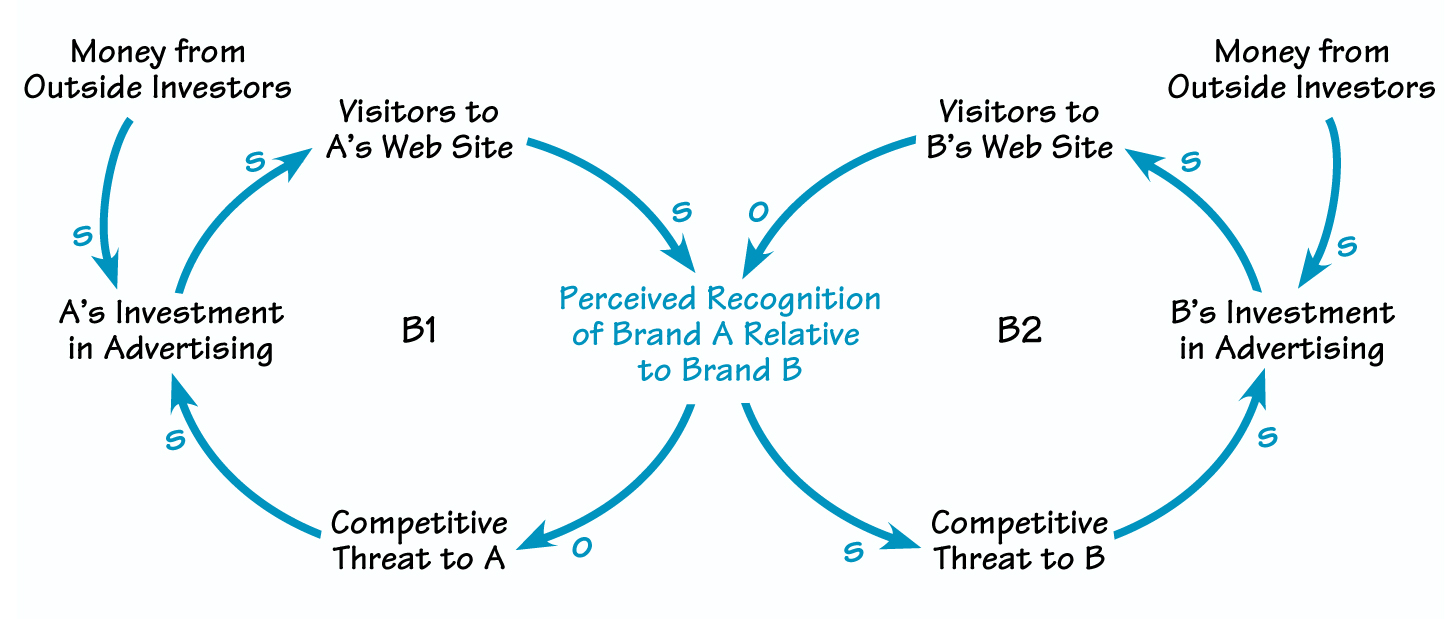Politicians have long adopted marketing strategies from the business world. Now, with the rise of competition on the Internet, Web-based enterprises seem to be taking their lead from political campaigns— fighting to be “the” winner in their market segment. The all-or-nothing nature of this game makes it difficult for politicians and executives alike to take a chance on tactics that might leave the other side with unfettered access to voters’ hearts and minds—or consumers’ wallets.
Just as the United States’ 2000 election campaign promises to shatter all fundraising and expense records, Internet companies are dumping unprecedented amounts of cash into building brand identity. While “bricks-and-mortar” retailers spend 3 or 4 percent of their revenue on advertising, some Web-based companies are investing more than they make in a year on wacky spots designed to draw buyers’ attention.
ESCALATING AD SALES

A subtle perceived advantage in brand recognition by one entrant (A) over another (B) can set off an escalating cycle of spending. As B feels increasingly threatened by A’s position in the market, it boosts spending on advertising to attract more visitors to its Web site (B2). A responds by further increasing its marketing efforts (B1). The cumulative effect of this winner-take-all mentality is massive advertising expenditures.
The Power of Perception
In the case of Internet initiatives, the driving force behind the cycle of escalation is a perception by one company (B) that its competitor (A) has an advantage in the marketplace (see “Escalating Ad Sales”). As B feels increasingly threatened by A’s dominant position, it boosts spending on advertising to attract more visitors to its Web site (B2). A responds by increasing its own marketing efforts (B1). Fueling this dynamic is the seemingly endless influx of capital from investors eager to hitch a ride on the next Microsoft. The cumulative effect of this winner-take-all mentality is a dramatic rise in advertising expenditures.
But this level of investment is unproven as a mechanism for guaranteeing long-term success. The key question is, does name recognition automatically lead to higher sales? The results so far are mixed. For example, CNet, an online information service company, launched a $100-million advertising campaign that has yet to produce a significant increase in the number of visitors to its site. Amazon.com has become a household name but continues to post losses. Time will tell if massive investment produces commensurate returns.
How can companies avoid this spending spree? One approach may be to recognize that the retail market is not a zero-sum game. There is always room for competitors who offer specialized value propositions or unique products and services. The key for businesses may be to rise above the siege mentality that forces them to respond to perceived threats from their foes. Instead, they could focus on tailoring their own offerings to suit their target audience and on finding creative ways to reach that constituency. Otherwise, the only winners may be the media outlets, who will gladly accept “contributions” from Internet companies and political campaigns alike.
Janice Molloy is managing editor of THE SYSTEMS THINKER and LEVERAGE.
